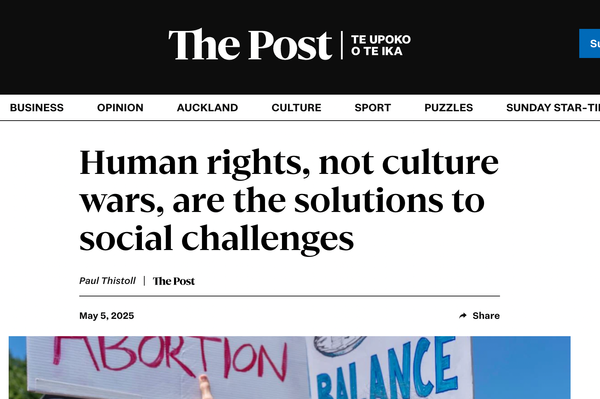Dr Parmar Should Read the Human Rights Act Sometime

Dr Parmjeet Parmar’s proposed Education and Training (Equal Treatment) Amendment Bill is not just legally flawed—it’s a fundamental misreading of Aotearoa’s human rights framework and constitutional principles. The bill, which seeks to prohibit tertiary institutions from conferring benefits “on the basis of race or ethnic origin,” doesn’t promote equality; it actively undermines efforts to correct systemic inequities. Amusingly, it has sparked an absurd social media exchange—pictured below—that attempts to reframe critique as a personal attack.
Let’s be clear: measures designed to address historical and structural inequities aren’t “race-based discrimination”—they’re necessary interventions to level the playing field. The Human Rights Act 1993 explicitly permits such measures through Section 73, which allows for affirmative action taken “in good faith for the purpose of assisting or advancing persons or groups of persons disadvantaged because of discrimination.” This is not a loophole; it is a recognition that genuine equality sometimes requires targeted approaches.
When AUT Law Dean Khylee Quince pointed out that Parmar had “forgotten where she lives,” this was not an attack on Parmar’s immigrant status, as some have disingenuously claimed - Parmar is an immigrant - that's a statement of fact. Quince was most probably making an inference to the bill’s glaring omission of Te Tiriti o Waitangi—the founding document of Aotearoa, which guarantees partnership, protection, and participation for Māori. Any legislation concerning public resource allocation must engage with Treaty obligations—not pretend they don’t exist.
The irony of David Farrar’s response is striking. By framing Quince’s comment as an attack on Parmar’s immigration status, he avoids engaging with the fact that Parmar’s bill is fundamentally at odds with New Zealand’s constitutional and human rights framework. It’s a classic misdirection tactic: rather than debating the legal merits of the bill, Farrar weaponises identity politics to deflect scrutiny. And tomorrow, undoubtedly, he will decry identity politics for his ideological purposes.
And then, Parmar’s final response deepens the confusion. She claims that immigration status is a prohibited ground of discrimination under the Human Rights Act—which it is not. Section 21 of the HRA lists national origin, race, and ethnic status as protected grounds, but “immigration status” is nowhere to be found.
For an MP proposing legislation in the name of “equal treatment,” one would expect a more accurate understanding of the law.
Substantively, the bill would gut universities’ ability to implement targeted programs addressing the entrenched educational disparities faced by Māori and Pacific students—disparities caused by generations of policies that privileged some groups while disadvantaging others. These programs are not arbitrary “race-based” initiatives; they are evidence-based responses to ongoing inequities.
Perhaps most troubling is ACT’s continued insistence that “equal treatment” means identical treatment—a concept thoroughly rejected by human rights jurisprudence worldwide. True equality acknowledges that different groups face different barriers, and thus require different interventions. Both the New Zealand Bill of Rights Act, The Human Rights Act, and our international human rights commitments affirm this principle.
If ACT is serious about improving educational outcomes, perhaps they should consult their party-aligned Chief Human Rights Commissioner—though one wonders if they’d recognise the Human Rights Act if it hit them in the face. Their proposed legislation isn’t just legally dubious; it’s a fundamental misreading of what equality means in a society founded on Treaty partnership.
Dr. Parmar’s bill doesn’t promote fairness—it entrenches disadvantage under the guise of neutrality. Before drafting legislation on “equal treatment,” ACT MPs might consider taking a remedial course in Aotearoa’s human rights framework and international human rights law.
I am sure any of Aotearoa’s excellent law schools might assist her with that.
